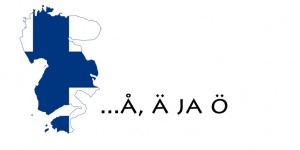Difference between revisions of "Language/Finnish/Pronunciation/Alphabet-and-Pronunciation"
(→Video) |
|||
| Line 164: | Line 164: | ||
*'''Y''' resembles German Über or French vU | *'''Y''' resembles German Über or French vU | ||
*'''Ö''' resembles the same sound in German | *'''Ö''' resembles the same sound in German | ||
==Authors== | ==Authors== | ||
Revision as of 12:48, 26 December 2020
Hei!
I'll try to tell you about pronunciation of Finnish.
In common, it's easier than English writing/reading system. You read words precisely as they are written. But there are also some vital details you should always remember.
Alphabet
The alphabet in Finnish is composed of 29 letters:
a, b, c, d, e, f, g, h, i, j, k, l, m, n, o, p, q, r, s, t, u, v, w, x, y, z, å, ä, ö.
The letters š and ž can occur only in loan words.
| Letter | Pronunciation |
|---|---|
| A a | [a:] |
| B b | [be:] |
| C c | [se:] |
| D d | [de:] |
| E e | [e:] |
| F f | [æf] |
| G g | [ge:] |
| H h | [ho:] |
| I i | [i:] |
| J j | [ji:] |
| K k | [ko:] |
| L l | [æl] |
| M m | [æm] |
| N n | [æn] |
| O o | [o:] |
| P p | [pe:] |
| Q q | [ku:] |
| R r | [ær] |
| S s | [æs] |
| T t | [te:] |
| U u | [u:] |
| V v | [ve:] |
| W w | [ve:], [kaksoisve:] |
| X x | [æks] |
| Y y | [y:] |
| Z z | [tset] |
| Å å | [o:], [ruotsalainen o:] |
| Ä ä | [æ:] |
| Ö ö | [ø:] |
Long and short sounds
As soon as Finnish uses really few sounds, the length of similar sounds is important. As example - tapaan sinut "I meet you" and tapan sinut "I murder you".
ee, aa, oo, uu
So if you see ee, aa, oo, uu - read them loooong . Usual letters you read in a usual manner.
It is a bit trickier with long konsomants , that are also important. Try NOT to read them as two discreet k-k, t-t etc. Try that instead :
- Set your mouth as if you are ready to say it.
- Take a very short pause.
- Say the sound - but strongly.
Congratulations, you've done it! :)
Perhaps it would be good if you train a bit with kk, pp, tt.
mm, ss, rr, nn, ll
Sounds mm, ss, rr, nn, ll don't need such an articulation, just say them a bit longer.
Ä, Y, Ö
Ä, Y, Ö are authentic for Finnish.
- Ä resembles "cAt" or "bAd" in English.
- Y resembles German Über or French vU
- Ö resembles the same sound in German
Authors
